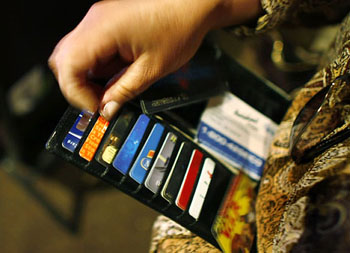Whenever you use a credit card, the merchant pays the credit card company an interchange fee. Usually it’s around 1-2% of the purchase amount, but it varies with the card. It’s also invisible, and credit card companies have long prohibited  merchants from passing along the charge to consumers, something they can get away with thanks to their monopoly status. Yesterday, however, the Department of Justice reached a settlement with Visa and Mastercard that changes this:
merchants from passing along the charge to consumers, something they can get away with thanks to their monopoly status. Yesterday, however, the Department of Justice reached a settlement with Visa and Mastercard that changes this:
Under the terms of the proposed settlement, merchants could offer consumers an immediate discount or rebate for using a particular type of payment, a particular credit card network (Visa versus American Express), or a low-cost card within that network (a Visa debit card rather than a Visa credit card).
That may give merchants an incentive to steer consumers toward paying with cash or with no-frills credit cards without rewards programs because the swipe fees for those options are lower. The settlement also allows merchants to post the cost of using different types of payments.
The settlement, however, does not allow merchants to levy a surcharge on credit and debit payments beyond the cost of the transaction, as some merchants had sought.
This is progress, though it’s not my preferred solution, which is to make these fees entirely public and allow merchants to pass them along to customers directly if they want to. As I wrote a couple of months ago:
If they don’t, that’s pretty good evidence that card networks are charging a fair price for the service merchants get from them (increased sales, less handling of cash, etc.). And there’s no harm done. But if they do tack on the charge, it’s pretty good evidence the networks aren’t charging a fair, market-clearing price. I say: let’s find out.
Maybe we’ll get there someday. In the meantime, at least this settlement should allow us to gather more data about exactly who ends up paying these fees and whether or not they’re mostly monopoly rents hoovered up by the credit card networks. Stay tuned.

















